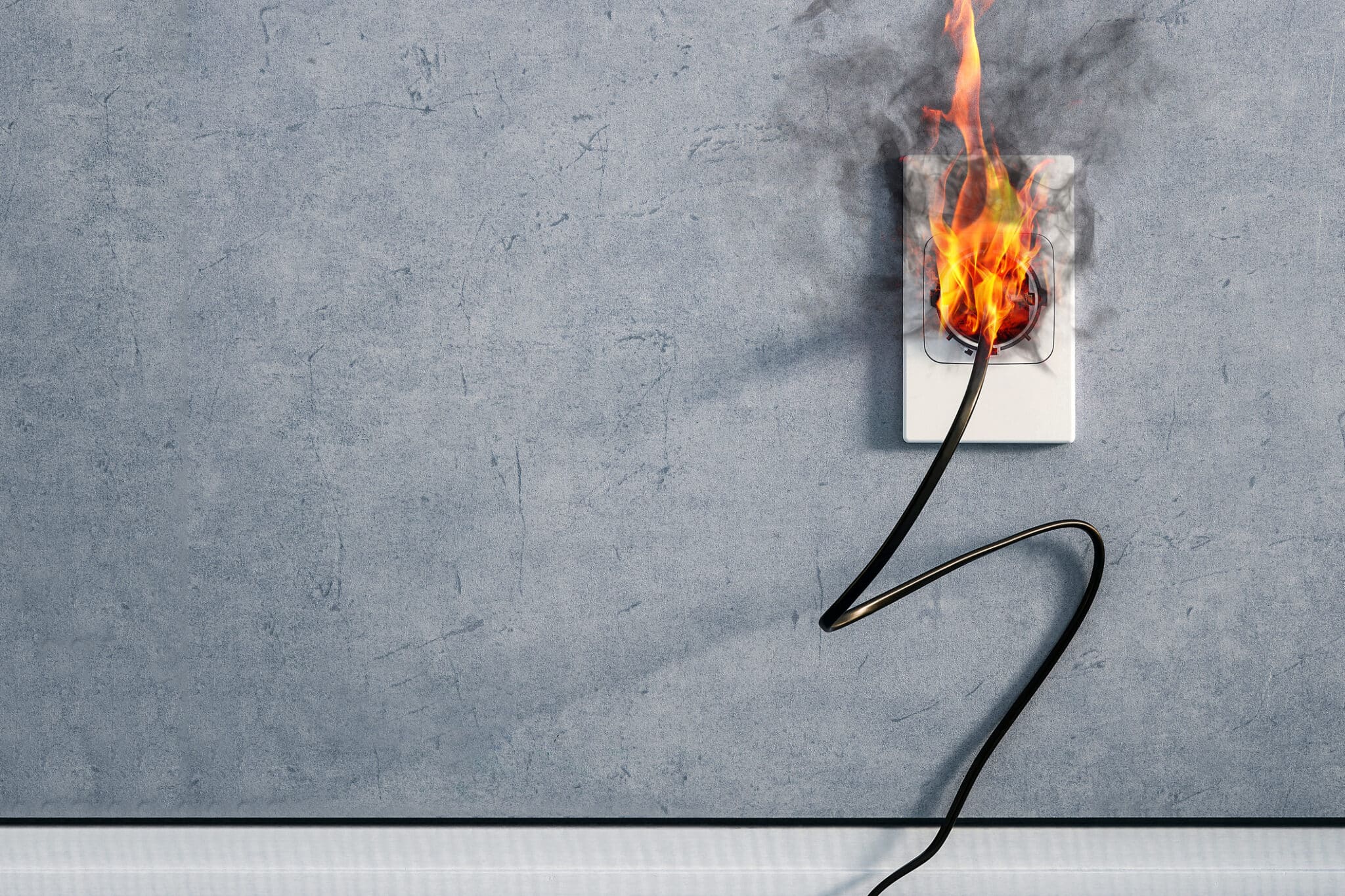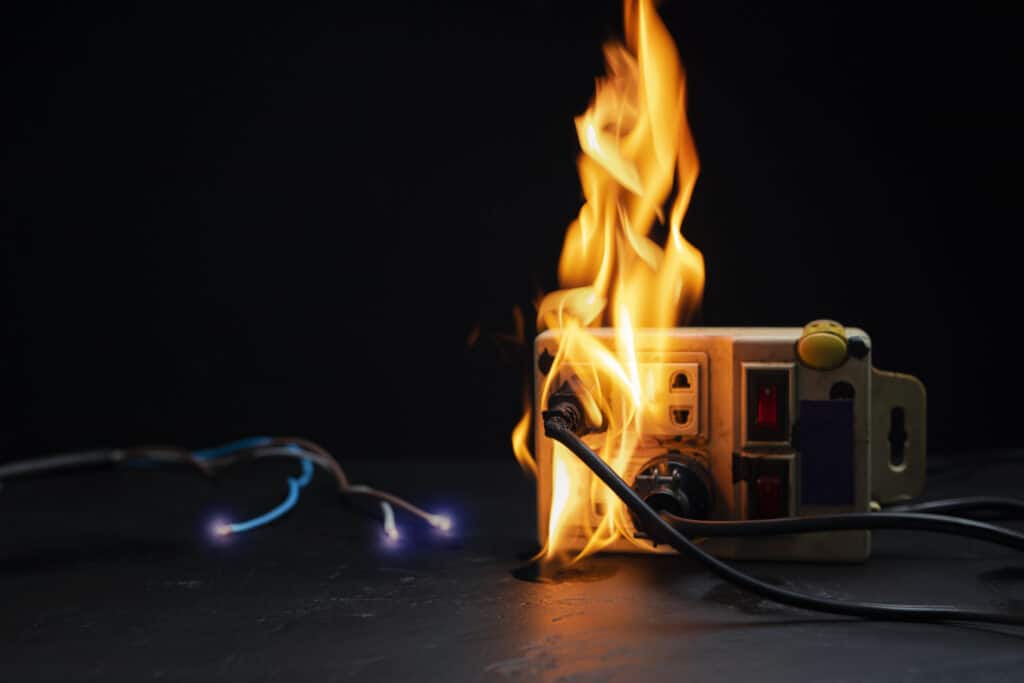
Electrical fires are one of the top causes of house fires, often triggered by faulty wiring, overloaded outlets, or malfunctioning appliances. Prevent these risks by scheduling regular electrical inspections, avoiding overloading outlets, and using the right wattage bulbs. Unplug unused devices, handle extension cords cautiously, and update old electrical systems as needed. If an electrical fire occurs, never use water; opt for a Class C extinguisher and call 911. Stay proactive to keep your home safe.

Did you know that electrical fires are one of the top causes of house fires? It’s scary to think about, but the good news is that most of these fires can be prevented with some simple steps.
Whether it’s an overloaded outlet, faulty wiring, or a misbehaving appliance, knowing what to look out for can make all the difference in keeping your home safe.
In this guide, we’ll walk you through the common causes of electrical fires and give you easy tips to prevent them. Let’s keep your home fire-free!
What Are Electrical Fires?
Electrical fires happen when electrical problems like faulty wiring, overloaded outlets, or malfunctioning appliances spark a flame.
Unlike fires caused by cooking or heating, electrical fires can start in hidden places, like behind walls or inside outlets, making them tricky to spot until they’re already out of control.
They don’t just start with a visible flame—they can smolder for a long time before bursting into a full fire. Because of this, understanding what electrical fires are and where they can come from is the first step in keeping your home safe.
Why Are Electrical Fires Dangerous?
Electrical fires are particularly dangerous because they can start silently and spread quickly. They often occur in hidden places like inside walls, where you might not notice the problem until it’s too late. Another big danger is that these fires can’t be put out with water—water conducts electricity, which can lead to electric shocks.
This makes them harder to control and extinguish compared to other types of fires. Electrical fires also produce toxic smoke that can be harmful to breathe in, making them even more hazardous to your health and home.
Common Causes of Electrical Fires
Faulty Wiring
Faulty or outdated wiring is a major cause of electrical fires. Homes that are older, especially those in areas like Tyler, TX, Whitehouse, TX, and Longview, TX, often have wiring that wasn’t designed to handle the electrical load of modern appliances.
Worn-out wires can fray, spark, or overheat, leading to fires that start behind your walls where you can’t see them.
If your lights flicker often or your circuit breakers trip frequently, it might be a sign of faulty wiring, and it’s a good idea to have an electrician inspect your home.
Overloaded Outlets
Plugging too many devices into one outlet or power strip is a recipe for disaster. Overloading outlets causes them to overheat, which can lead to a fire that starts at the outlet and spreads quickly.
It’s easy to fall into the habit of plugging in multiple gadgets, especially with the many electronics we use daily. To stay safe, make sure to distribute your devices across multiple outlets and avoid using too many high-wattage appliances on the same circuit.
Appliances and Equipment
Old or damaged appliances can be ticking time bombs when it comes to electrical fires. Frayed cords, damaged plugs, or faulty wiring inside appliances can create sparks and ignite nearby flammable materials.
It’s important to regularly inspect your appliances and replace any that show signs of wear, such as exposed wires or loose connections. Even common items like toasters, microwaves, and space heaters can pose a risk if they’re not maintained properly.
Space Heaters and Electrical Blankets
Space heaters and electrical blankets provide extra warmth, but they can be dangerous if not used correctly. These devices can overheat or cause nearby items, like curtains or bedding, to catch fire if placed too close.
Always make sure your space heater has an automatic shutoff feature and never leave it running unattended. Electrical blankets should be checked for damage before use and shouldn’t be left on for extended periods. By using these items responsibly, you can enjoy their warmth without risking a fire.
How to Prevent Electrical Fires at Home
Regular Inspections
One of the best ways to prevent electrical fires is by having regular inspections of your home’s electrical system. An electrician can identify potential hazards like outdated wiring, overloaded circuits, or faulty outlets before they become serious problems.
For homeowners in Tyler, TX, and nearby areas, this is especially important if your home is older or hasn’t had an electrical inspection in a long time. Regular inspections can give you peace of mind and help ensure that your home remains safe and secure.
Avoid Overloading Outlets and Power Strips
It’s easy to overload outlets and power strips without even realizing it, especially in today’s gadget-filled homes. However, doing so is a major fire risk, as it can cause overheating and spark a fire.
To avoid this, make sure not to plug too many high-wattage devices into a single outlet or power strip. If you find yourself constantly needing more outlets, consider having an electrician install additional ones to safely handle your electrical needs.
Unplug Devices When Not in Use
Unplugging devices when they’re not in use is a simple yet effective way to prevent electrical fires. Many devices, like chargers and small appliances, continue to draw power even when turned off, which can lead to overheating.
By getting into the habit of unplugging things like toasters, hairdryers, and phone chargers when they’re not being used, you reduce the risk of them overheating and causing a fire. It’s a small change that can make a big difference in keeping your home safe.
Use the Right Light Bulbs
Using the correct light bulbs for your fixtures is another key step in preventing electrical fires. Light fixtures are designed to handle specific wattages, and using a bulb that exceeds that limit can cause the fixture to overheat.
This overheating can eventually lead to a fire, especially if the fixture is near flammable materials like curtains or bedding. Always check the recommended wattage for your light fixtures and never exceed it.
Be Cautious with Extension Cords
Extension cords are convenient, but they’re not meant to be permanent solutions. Running extension cords under rugs, behind furniture, or using them as a long-term fix can lead to overheating and, eventually, a fire.
If you find you’re relying on extension cords regularly, it’s a sign that you need more outlets or a better arrangement of your electrical devices.
By using extension cords only when necessary and making sure they’re in good condition, you can reduce the risk of electrical fires.
Upgrade Old Electrical Systems
If your home’s electrical system is outdated, it might not be equipped to handle the demands of modern appliances and electronics. Old wiring, outdated circuit breakers, and insufficient outlets can all contribute to the risk of electrical fires.
Upgrading your electrical system can be a significant investment, but it’s one that pays off in safety and peace of mind. For those living in older homes in places like Longview, TX, or Whitehouse, TX, it’s worth considering an upgrade to keep your home safe.
Recognizing the Warning Signs of Electrical Problems
Flickering Lights
Flickering lights might seem like a minor annoyance, but they can be a sign of a bigger problem. If your lights flicker frequently, it could indicate an issue with the wiring or the circuit they’re connected to.
This could be due to loose connections, faulty wiring, or an overloaded circuit, all of which can lead to electrical fires if not addressed.
If you notice your lights flickering often, especially when you’re using other electrical devices, it’s a good idea to have an electrician take a look.
Burning Smells
A burning smell in your home is never a good sign, especially if it’s coming from an outlet, appliance, or your electrical panel. This smell could indicate that wires or electrical components are overheating, which is a serious fire risk.
If you ever smell something burning and can’t immediately identify the source, it’s crucial to turn off the power to that area and call an electrician right away. Ignoring this warning sign can lead to a dangerous electrical fire.
Warm or Discolored Outlets
Outlets that are warm to the touch or show signs of discoloration should never be ignored. These symptoms often mean that the outlet is overheating, which can be caused by an overloaded circuit, faulty wiring, or a damaged outlet.
Over time, this overheating can ignite a fire. If you notice that any of your outlets are warm or discolored, it’s essential to stop using them immediately and have them inspected by a professional.
What to Do in Case of an Electrical Fire
Don’t Use Water
If an electrical fire breaks out, your first instinct might be to grab a bucket of water or a garden hose, but that’s actually the worst thing you can do. Water conducts electricity, and using it on an electrical fire can not only spread the flames but also cause you to get shocked.
The water can carry the electric current, putting you and anyone else nearby at serious risk. Instead, your first step should be to turn off the power at the main breaker if it’s safe to do so. This can help stop the flow of electricity and may prevent the fire from spreading further.
Use a Fire Extinguisher
If you’re dealing with an electrical fire, it’s crucial to use the right type of fire extinguisher—specifically, a Class C extinguisher.
These are designed to combat fires involving electrical equipment without conducting electricity, making them safe to use around live electrical components.
Using the wrong extinguisher, like one meant for grease or wood fires, can make the situation worse. Follow these steps to safely extinguish the fire:
- Pull the pin: The pin is a safety feature that prevents accidental discharge. Pulling it out will allow you to use the extinguisher.
- Aim low: Point the nozzle at the base of the fire, not at the flames themselves. Aiming low helps tackle the source of the fire directly.
- Squeeze the lever slowly: Begin discharging the extinguisher by squeezing the lever slowly and steadily. This will release the extinguishing agent onto the fire.
- Sweep the nozzle from side to side: Move the nozzle in a sweeping motion from side to side, covering the full area of the fire. Continue this motion until the fire is completely out.
By using the extinguisher correctly, you can quickly and effectively put out an electrical fire, minimizing damage and keeping everyone safe. Always remember, if the fire is too large or out of control, evacuate immediately and call the fire department. Safety comes first!
Call 911 Immediately
Even if you think you’ve got the fire under control, don’t hesitate to call 911. Electrical fires can reignite or spread quickly, and it’s always better to have professional firefighters on the scene.
Firefighters are trained to deal with all types of fires, including electrical ones, and they have the equipment and knowledge to handle the situation safely.
While waiting for them to arrive, make sure everyone evacuates the area and stays at a safe distance. Your safety is the top priority, so leave the firefighting to the experts.
When to Call an Electrician
Knowing when to call an electrician can be the key to preventing an electrical fire in your home. Don’t wait until a small issue becomes a big problem.
If you notice anything unusual with your electrical system, it’s better to be safe than sorry. Here are some clear signs that it’s time to call a professional:
- Frequent Circuit Breaker Trips: If your circuit breaker trips often, it’s a sign that your electrical system is overloaded or there’s a short circuit somewhere. An electrician can diagnose and fix the issue before it leads to a fire.
- Outlets or Switches Not Working Properly: Outlets that don’t work, switches that spark, or light fixtures that flicker are all signs of potential electrical problems. These issues could be due to faulty wiring, which needs to be addressed promptly.
- Burning Smell or Scorch Marks: If you smell something burning or see scorch marks around your outlets, don’t ignore it. This is a serious sign that your wiring is overheating and could lead to an electrical fire.
- Warm or Discolored Outlets: Outlets that are warm to the touch or have discoloration are another warning sign of an electrical problem. This could indicate that the outlet is overloaded or there’s a loose connection.
Calling an electrician when you first notice these warning signs can prevent small issues from becoming major hazards.
Regular maintenance and inspections can also help ensure that your home’s electrical system is in good working order, keeping you and your family safe.
Don’t Wait for a Spark – Stay Safe with Mister Sparky of East Texas!
Electrical issues can turn dangerous fast—don’t let a small problem become a big hazard in your Tyler, Whitehouse, or Longview home.
At Mister Sparky of East Texas, our expert electricians are ready to help you prevent electrical fires and keep your home safe. Schedule your inspection or repair today and let us handle your electrical needs with professionalism and care!

FAQs
What is the most common cause of electrical fires?
The most common cause of electrical fires is faulty wiring. Over time, wires can wear out, become loose, or get damaged, leading to sparks that can ignite a fire. Overloaded outlets and power strips are also frequent culprits, as they can overheat when too many devices are plugged in.
Can I put out an electrical fire with water?
No, you should never use water to put out an electrical fire. Water conducts electricity, and using it can cause the fire to spread or result in electric shock. Instead, use a Class C fire extinguisher designed for electrical fires, or turn off the power and call the fire department.
How can I tell if my home has faulty wiring?
Signs of faulty wiring include frequent circuit breaker trips, flickering lights, outlets that don’t work, or a burning smell near outlets or switches. If you notice any of these warning signs, it’s important to call an electrician immediately to inspect and repair your electrical system.
Are older homes more at risk for electrical fires?
Yes, older homes often have outdated wiring that wasn’t designed to handle the electrical load of modern appliances. This can increase the risk of overheating and fires. If you live in an older home, it’s a good idea to have an electrician inspect your wiring and make any necessary updates.
What should I do if I smell something burning but can’t find the source?
If you smell something burning and can’t locate the source, turn off the power at your main breaker and call an electrician right away. Burning smells are often a sign of overheating wires or electrical components, which can quickly lead to a fire if not addressed.









